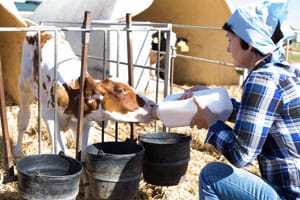Conventional Cattle on Organic Dairy Farms
[This article was previously published in the spring issue of The Cultivator, Cornucopia’s quarterly newsletter.]
by Kestrel Burcham, JD
Director of Domestic Policy at The Cornucopia Institute
The organic dairy industry is in a state of crisis. A glut of organic milk in the market is putting economic strain on family-scale dairies, forcing some to close their doors after generations of operation.
 |
A significant cause of the problem is overproduction by industrial-scale organic producers edging their competitors out of business. “Factory” dairies—many milking thousands of cows—have perfected ways to game the system to gain an economic advantage.
One of their insidious methods is to leverage their scale advantage by rotating conventionally raised calves and heifers into organic production.
Cows start lactating around two years of age, when they give birth to their first calves. Organically raised calves usually consume milk, by bottle or bucket—the same quality of organic milk we buy in the grocery store or co-op—from the time they are born until they are weaned.
When a dairy cow “ages out” or otherwise is removed from production, she needs to be replaced if the dairy wants to maintain the same level of production.
The organic regulatory framework allows for the conversion of a distinct herd of dairy cows to certified organic production a single time. In this vein, some operations do not raise their young calves as replacements for their culled cows.
Instead, they purchase cheaper, conventional cattle raised on medicated milk replacer that commonly includes antibiotics and other banned pharmaceuticals and substances. After being weaned, these calves are fed conventional grains (usually GMO) and hay treated with toxic chemicals.
Then, in their second year of life, approximately one year before they start producing milk, they are switched to organic management.
This method facilitates high milk production and “burn out,” sending cows off to slaughter prematurely. This short lifespan is similar to cattle longevity on large, conventional factory dairies.
These practices competitively disadvantage ethical organic dairy farmers who follow the spirit and letter of the law. True organic calves are raised on organic milk until weaning. On a family-scale dairy, this is a simple system where some of the milk the farmer produces is fed to their own calves born from their milking herd.
These dairies should be able to make extra money by selling their surplus organic calves to other organic dairies. But this market has been virtually nonexistent since the USDA and certain major certifiers have allowed cheap conventional calves as replacement stock. These practices have also been legally questioned as a gross desecration of the purpose behind the language in both the Organic Foods Production Act (OFPA) and organic regulations.
Nevertheless, the USDA has refused to act, having neglected to enforce a set standard, clarify the existing rules, or create a guidance for organic certifiers—all of which could cure this crisis.
Congress intended OFPA to create a level playing field. Some certifiers do not permit farmers to “continually convert” cattle to organic production once a farm has been certified.
Others, with greased palms from their largest clients, are accepting of the practice. In 2017, the USDA stated that addressing this gross inconsistency is no longer a priority for the agency.
For industrial-scale, organic dairies, rotating conventional calves into their herds can amount to as much as a $1 million increase or more in milk sales per year, on top of the lower costs for raising young stock.
Meanwhile, existing family-scale dairies have to compete with these unfair practices on thin margins.
Persons interested in these issues can seek out more information in Cornucopia’s report, The Industrialization of Organic Dairy.
Consumers who want to support family-scale organic dairies—those who raise their own replacement calves on organic milk—can find the best brands identified on Cornucopia’s Organic Dairy Scorecard.

